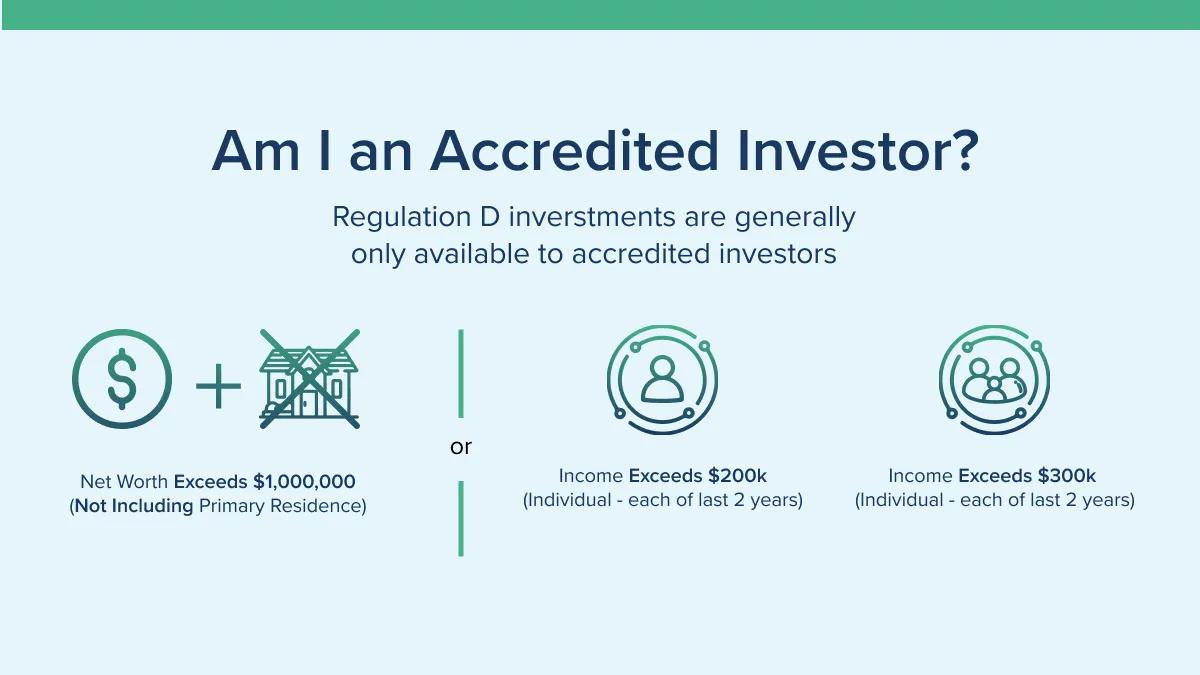March 20, 2024
Unlock a world of high-return investment opportunities for accredited investors, from private funds to venture capital. Simplify your journey through diverse options like hedge funds, rural investments, and more, designed to diversify and strengthen your portfolio.

James, after years of disciplined saving and strategic stock market investments, recently discovered his net worth had surpassed the $1 million threshold, excluding his primary residence. This achievement wasn't just a personal milestone; it unlocked his status as an accredited investor, opening up new avenues for investment previously beyond his reach, such as private equity and real estate syndications.
As the investment landscape evolves, proving your status as an accredited investor remains crucial for accessing select high-risk/high-return opportunities. An accredited investor is defined by the Securities and Exchange Commission (SEC) as someone who meets specific financial thresholds, enabling them to participate in private offerings and other securities not registered with financial authorities.

Meeting the SEC's criteria doesn't necessarily mean financial expertise but indicates the capacity to bear potential losses. This status opens doors to investments in hedge funds, private equity, and real estate syndications.
Verification can involve providing tax returns, W-2 forms, and financial statements verified by a CPA or third-party. A CPA-written accredited investor letter can confirm you meet the criteria, often sufficing for private real estate investments.
This letter includes:
[Your Name]
[Your Address]
[City, State ZIP Code]
[Date]
[Issuer Name]
[Issuer Address]
[City, State ZIP Code]
Dear [Issuer Name],
As an accredited investor under Rule 501 of Regulation D of the Securities Act of 1933, I confirm my individual/joint net worth exceeds $1 million, excluding my primary residence’s value, or my annual income was over $200,000 (or $300,000 with my spouse) for the last two years, with the same expected this year.
Sincerely,
[Your Name]
Some real estate syndications allow investment without accredited status under SEC’s Rule 506 B of Regulation D, depending on the fundraising method.
Platforms like Verify Investor and Parallel Markets offer free accredited investor status verification, providing a convenient solution for investors.
Entities with assets over $5 million, including corporations, LLCs, and trusts, can also qualify as accredited investors, expanding the scope of who can invest in these exclusive opportunities.
The investment landscape for accredited investors is rich with opportunities that offer a spectrum of risk and reward. Understanding each type of investment is crucial to navigating this complex environment successfully.
Lastly, Direct Energy, Oil, and Gas Investing opens a direct line to the energy sector. This avenue allows investors to partake in partnerships, joint ventures, or direct ownership in oil and gas wells, leveraging the inherent volatility of the energy market for potential significant returns. It's an attractive option for those seeking to diversify their portfolio with investments that offer a unique blend of risk and reward, in line with the qualifications for accredited investors.

After exploring the various investment opportunities available to accredited investors, James decided to diversify his portfolio by investing in the energy sector, particularly interested in lowering his taxable income through strategic investments. He discovered Fieldvest, a platform tailored for investors like him, offering access to direct energy, oil, and gas investing opportunities.
Fieldvest made it simple for James to find and manage his investments in energy projects that not only promised potential high returns but also offered tax benefits. By engaging in a joint venture in an oil well, James utilized the platform's tools to track his investment's performance and manage his stake effectively.
This move not only diversified his portfolio into a sector with high potential returns but also leveraged tax incentives associated with energy investments to reduce his taxable income. James's strategic decision to invest through Fieldvest not only aligned with his financial goals but also introduced him to a sector capable of delivering both growth and tax efficiency.
For 2024, the world of investment continues to offer diverse opportunities for accredited investors, from traditional hedge funds and real estate ventures to direct investments in the energy sector. Proving your accredited investor status remains a gateway to these exclusive markets, with the accredited investor letter playing a pivotal role in accessing these opportunities.